#epiousios
Explore tagged Tumblr posts
Note
Pmmm has just, never recovered from ppl falsely calling it a super deep deconstruction of the magical girl genre when its a like, modestly deep tragedy using magical girl conventions to tell its story. As well as the pmmm knock offs. Vast majority of bad faith criticisms of the show have extremely reactionary origins and barely even attached to the actual text of the show. While it appears actual pmmm fans have revisited the source material and appreciate the show for what it is, obviously the haters wouldn't, thus make their arguments primarily based around second hand info and years old fandom discourse.
YEAH thats what it seems like to me as someone who only got into it recently. it annoys me tho bc that attitude is why i didnt check it out for the longest time. the most damning things people accuse it for is stuff i cant really even find a source for, like the "the writer wanted you to think the girls are selfish bitches" thing.
also the whole "it inspired a lot of shitty knock offs" thing is a dumb argument for everything. its dumb for shrek and its dumb for madoka
#yeah shrek is a meme but its generally considered to be a good movie if you dont have a stick up your ass abt it being a meme#mail#epiousios
7 notes
·
View notes
Text
Yo, this is fascinating.
Therefore, the use of epiousios seems indeed to occur nowhere else in ancient Greek literature besides Matthew, Luke, and The Didachē.
she tower on my babel till I ἐπιούσιον
152K notes
·
View notes
Text
Samiotisches Kaffee-Tagebuch: am Ende der Welt
Samiotisches Kaffee-Tagebuch: am Ende der Welt
Ich folge der Hauptstraße von Koumaradei über Pyrgos bis nach Agii Theodori, dem nördlichsten Punkt meiner heutigen Tour. Von dort nehme ich Richtung Südwesten die frisch ausgebaute Straße nach Marathokambos. Die Kreisstadt war früher einmal sehr reich. Der frühere Wohlstadt der im 16. Jahrhundert gegründeten Stadt, kam von den Erträgen der damals sehr zahlreichen Ölbäume, sowie von dem kleinen…

View On WordPress
#Café am Ende der Welt#Café frappé#Caffè frappe#Epiousios#Epiouzion#Frappé#Frappe#Kambos#Kampos#Limnionas#Marathokambos#Nescafé frappé#Ormos Marathonkambou#Panagia Myrtidiotissa#Psili Amos#Pythagorio#Samiopoula#Taverna Epiouzion#Taverne am Ende der Welt
0 notes
Text



@epiousios sorry about the quality, not used to making gifs this long.
#gif#dcst#dr stone#dr. stone#drstone#dcst senku#dr stone senku#senku dr stone#senku ishigami#dcst gen#dr stone gen#gen dr stone#gen asagiri#asagiri gen
122 notes
·
View notes
Text
20240723
Give us day by day our daily bread.
τὸν ἄρτον ἡμῶν τὸν ἐπιούσιον δίδου ἡμῖν τὸ καθ᾽ ἡμέραν·
Luk 11:3
ἄρτος (artos)=bread
ἡμῶν (hēmōn)=our
ἐπιούσιος (epiousios)=daily
δίδωμι (didōmi)=give
ἡμῖν (hēmin)=us
κατά (kata)=day
ἡμέρα (hēmera)=by day
0 notes
Text
What does Matthew 6:11 mean?
Matthew 6:11 KJVGive us this day our daily bread. Matthew 6:11 MKJVGive us this day our daily bread; Mt 6:11 NKJVGive us this day our daily bread. Matthew 6:11 KJV 2000Give us this day our daily bread. Interlinear KJV Give /didomi/ us /hemin/ this day /semeron/ our /hemon/ daily /epiousios/ bread. /artos/ Albert Barnes’ Commentary Verse 11. Give us this day, etc. The word bread here…
View On WordPress
0 notes
Text
tags via @epiousios:
#comics dynamic is the superior dynamic but also yja clark wasnt even in the wrong everyone else was being a freak about#his reasonable level of discomfort towards realizing he had his dna stolen and was cloned without his consent BY HIS ENEMIES
tags via @dandelightin:
#m h m#there’s no time to be existential when your edgy cooler younger self is literally suing for the rights to be you
it really is such a shame that yj put the idea of clark being weird about kon in peoples' heads & that now that's kinda become the norm for portrayals of them bc the original version of clark coming back from the dead to find out kon a) existed and b) had trademarked the name "superman" while he was dead & was now threatening to sue for copyright infringement is pure gold. like i'm sorry, but that is an objectively superior dynamic
#BOTH OF THESE#most of the time I want to yeet yj animated off a cliff lol#Clark Kent#Kon El#superfam#Young Justice#I don't even have a tag for YJA hkldjfkldsj what should I do#YJ Animated#Young Justice Animated#?????#dcu#dca
1K notes
·
View notes
Text
Eat, for this is Her Body: Chainsaw Man and the Doxology of Cannibalism
"One day," Anthony Oliveira writes in "The Year in Apocalypses," [Jesus'] disciples approached their master while he was silent in prayer and made a request: 'Lord, teach us how to pray.'" From here, Jesus teaches them the Lord's Prayer, what the Catholic Church once called "the summary of the whole gospel":
Our Father, who art in heaven, hallowed be thy name; thy kingdom come; thy will be done on earth as it is in heaven. Give us this day our daily bread; and forgive us our trespasses as we forgive those who trespass against us; and lead us not into temptation, but deliver us from evil.
Denji is no one's disciple. When we first meet him, he is closer to how Oliveira describes Jesus himself, "homeless, gleaning for food in the field like a sparrow and relying on the kindness of strangers to put him up, . . . a man cheerfully resigned to powerlessness." And so, Denji doesn't need to be taught how to pray. He has always known. Every bone in his body at the opening of Chainsaw Man sings out the Lord's Prayer: "forgive me my debts", "deliver me from evil." And, of course, Denji is intimately familiar with the prayer's most pitiable, most powerful line. It's this line that he cries out to Makima when he rests, Pieta-like, in her arms at the end of the first chapter. It can only be this line, one that Denji might have written himself:
Give me, from this day forward, and for all the rest of my days, daily bread.
Bread runs throughout CSM like a mocking scent that you only fully identify in the last two chapters. It should have been a sign to all of us when the first meal Makima buys for Denji is not bread (but rather a hot dog and udon noodles). It isn't until Denji meets and enters Aki's home that he is seen making a hideously overladen slice of toast for himself, luxuriating in having all the toppings he was denied. The morning after she forces Denji to open the door to Power's death, Makima makes the very breakfast she once promised to serve Denji: eggs, coffee, salad, and sliced bread. But this is a meal that Denji never eats—maybe the only meal in the entire series that he, a survivor of the meanest starvation and poverty, ignores. There is only one other time we see this meal in CSM, and it is subtle, almost off camera, though no less meaningful: in Chapter 53, after Reze's death, as Denji sits down to breakfast once more with Power and Aki.
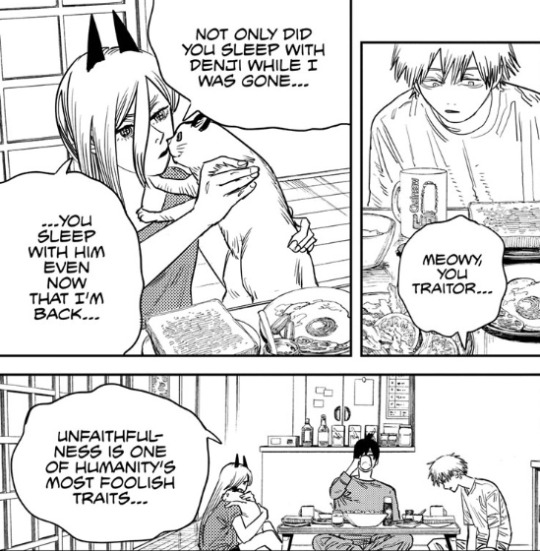
To revisit CSM's public safety arc is to see all the ways the plot connects itself to food and the act of eating, both appetizing and revolting, both profound and profane. Denji, eating gyoza at a bar for the first time. Denji being forced to swallow barf as he is kissed for the first time. The Fox Devil, who eats indiscriminately and on command, who refuses to return to Aki after being fed something disgusting. A fox that is hunted and transformed into stew. Denji eating sandwiches at Reze's cafe. Aki and Angel eating noodles. A woman sitting down to eat a hamburger for the first time, before she commits mass murder. She is worried she has lost her taste buds, yet she exclaims, "So delicious!" We know, later, that this woman is a liar, that no part of her is what she presents herself to be. Should we take this moment at its face value then? Was Santa Claus simply lucky enough to have preserved her sense of taste? Or was it her one last act of humanity, to recognize that it is not enough just to eat, that man does not live on bread alone, that there must be at least food that is also delicious, that inspires people to get up and dance—even if it means she has to lie about what she can experience?
Food is necessary for survival, and CSM is a story about survival. But CSM is also a story about glimpsing the after. After you know you can keep living, what next? After you are no longer starving, after you have been forced to kill a friend, after you have touched your first boob, after you have been betrayed, what next? After you are tired of eating toast with jam for breakfast, what do you eat next?
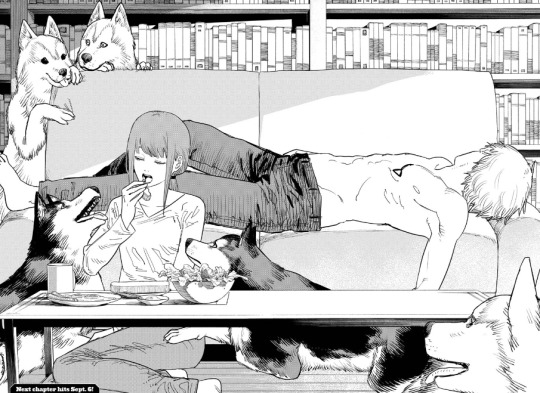
The version of the Lord's Prayer we tend to recite asks for "our daily bread." But this, most modern scholars believe, is a mistranslation. The Greek adjective as it appears in the Gospel of Matthew and Luke is "epiousios," which doesn't mean "daily" at all, but rather something too complicated etymologically for me to even begin to parse. The point is that what we ask for in the Lord's Prayer is not just bread for today, but bread for tomorrow. Both the physical bread and the spiritual bread. Bread on this kingdom of earth, and bread that is the kingdom of heaven. Bread to feed our bodies, and bread to feed our souls. The realm of the divine is full of these moments, isn't it? Of two things existing at once, in one.
Denji starts the series asking for daily bread, and ends the public safety arc with Nayuta, Makima's reincarnation, asking him for daily bread. Trash heap Denji, living with his not!dog Pochita, really was just asking for daily bread. A slice to eat for breakfast, maybe even with butter and jam. But he too learns that bread, physical bread, is not enough. Merely to subsist, to eat good food, is an empty life. And what he must give Nayuta is not just bread, as was given to him. Otherwise, he will be trapped in a cycle of creating more Makimas. Instead, he must give her a relationship, a family, a world that Makima was unable to create. He must give her, in Pochita's words, lots of hugs. He must give her, in the words of the Lord's Prayer, epiousios.
To be clear, I am not arguing that CSM is meant to be read through a Catholic lens, and I doubt Fujimoto had all of this in mind when he wrote it (though he must have thought something, given that he drew a very large print of Gustave Dore's "Satan descends upon Earth" in Makima's entranceway!). But there is something primal (primordial?) about the Lord's Prayer. If every reader can understand the horror that the Darkness Devil represents, so too we can understand the intimacy and comfort of the Lord's Prayer. It is, as Oliveira writes, "a simple peasant's mantra for detoxing anxiety." Jesus opens by addressing God as father—not king, not an all-mighty spiritual being, but rather "abba, which is rather closer to 'dad,' and not in the intercultural Greek of his adulthood, but the Aramaic of home and childhood." The Lord's Prayer asks for what we always want, the only thing any of us have ever wanted since leaving the womb as infants: for no bad things to happen, for there to be enough to eat.
Even if what we have to eat is another person.
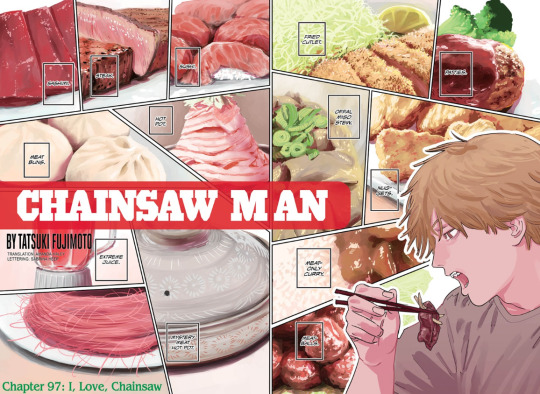
At the center of the Christian liturgy is the Last Supper, and at the center of the Last Supper is a meal that functions as ritual, abomination, accusation, transubstantiation, paranoia, and an early example of cracking open a cold one with the bros. Here, Jesus shares bread and wine with his disciples and then, as if trying to invent r/creepypasta years before its time, informs them they are actually eating his flesh and blood. This image is so powerful and heretical that the Romans accused early Christians of being cannibals. And why shouldn't they? It's there in the text. "Take, eat. This is my body. This is my blood." Stripped of the grandeur of tradition and ritual, this is downright vampiric. And yet it goes on to become the cornerstone of the Christian faith.
Oliveira begs us to see the Last Supper as a family meal, one shared by Jesus and his found family. "All he is really saying is, 'I hope when you eat together, you remember me.'" It's a good reading, one that moves me to tears, and is the framework through which I see the events of chapter 80. Because Makima is not the first time that Denji "consumes" a friend, and I don't just mean him sucking Power's blood or taking Pochita into himself. When Aki died, he left half his fortune to Denji, who uses it to support himself and Power. They "pigged out on good food," he tells us. This is Aki's symbolic body, through which he provides Denji his daily bread. Eat ice cream and onigiri in remembrance of me.
But it is not how I see the events of chapter 96. Denji does not eat Makima in the context of a feast. He does not partake of her in a communal meal, as Jesus did, among his found family. He eats every bite of Makima alone. Jesus said before his death, "this is my blood, which is shed for many." Yet Denji says to Makima, I alone will absolve you alone of your sins. I alone will bear you alone.
Denji's Last Supper is a lonely remembrance. He is hoping that no one but him will remember her. He is hoping to wholly consume her, because he loves her. "We love as cannibals," French philosopher and activist Simone Weil wrote. "Beloved beings . . . provide us with comfort, energy, a simulant. They have the same effect on us as a good meal. . . . We love them, then, as food." In fact, Weil believed we cannot love any other way. As humans, we are forever doomed to want to eat the ones we love. In order to escape, we must both be devoured by God and then become food for our fellow human beings. As Alec Irwin writes of Weil's philosophy, "the devouring violence of God must be positively harnessed in order to dismantle the machinery of human cruelty."
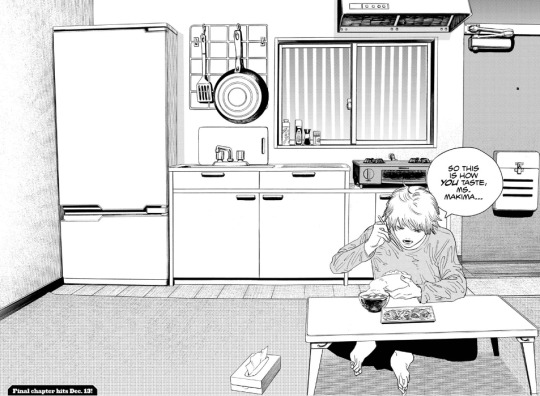
If Weil is right and being devoured is transformation, a crucial part of salvation, then in eating Makima, Denji redeems her. He turns her into food to break the cycle of her cruelty. For Makima's power itself is consuming, cannibalistic. She "eats" humans in order to use her power, which remains mysterious like God moving across the face of the earth, leaving only broken corpses as a sign of its presence. So it must be Denji, not Chainsaw Man, who does the consuming. If Pochita had consumed her, as she had always prayed for, then it would simply be another act of violence being enacted. Instead, Denji gives her salvation by turning her into human food—his food.
To Denji, Aki was human, his family, his brother, his friend. It is Makima he loves as a God and a woman. To him, she is Satan and God, his betrayer and his creator, his salvation and his friends' damnation. So he must take her, consume her, digest her, excrete her, reduce her to nothing, as she once consumed and excreted and reduced him. "I ate her to become one with her." He ate her to become her. There is no truer form of his love than for Denji to take Makima into himself. I use those words purposefully, because this is the rejection of classic cishet PIV penetration, that old hoary chestnut of men inside women. As Don Delillo famously outlines in White Noise, we talk about sex as if women are containers, rooms, elevator lobbies: "He entered me," "I want him inside me," "I took him into myself." Denji and Makima never have physical sex, but this is a consummation, a reversal of roles. We are given the only sex that Shounen Jump will allow us, with Denji taking Makima into himself. She enters him. She is inside him. He is—physically, emotionally, willingly—penetrated by her flesh. She is released inside of him, becoming part of him.
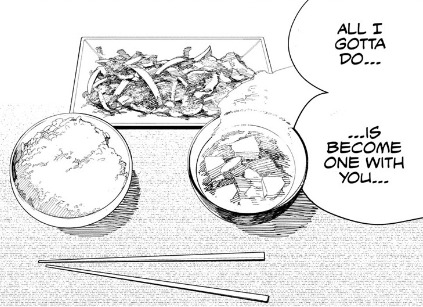
Because the divine is full of moments like this, isn't it? Of two things existing at once, in one. That is the kingdom and the power and the glory. For Makima now lives in that country inhabited by God, where loving and eating are one and the same. For that country is none other than Denji's body.
In conclusion:

Substitute Makima for "God", and the preceding statements are still rigorously accurate.
Further Reading:
Anthony Oliveira's ongoing podcast reading the Gospel of Mark (Patreon exclusive, but I highly recommend, even/especially if you are a heathen like me)
Hannibal (NBC)
Daniel Birnbaum and Anders Olsson, An Interview with Jacques Derrida on the Limits of Digestion
David Farrell Krell, "All You Can't Eat: Derrida's Course, "Rhetorique du Cannibalisme (1990-1991)." Research in Phenomenology, vol. 36, 2006, pp. 130–180. JSTOR, www.jstor.org/stable/24660636.
Alec Irwin, “Devoured by God: Cannibalism, Mysticism, and Ethics in Simone Weil.” CrossCurrents, vol. 51, no. 2, 2001, pp. 257–272. JSTOR, www.jstor.org/stable/24460795.
117 notes
·
View notes
Note
Apparently the gist of the joke of that post with "epiousios" was that one can begin to accidentally pray during sex. Non-English languages don't translate the acronyms of ebook formats.

Yeah, I got the joke. I was making an additional joke about how DeepL gave an absolutely nonsensical response when I checked to see what it would say.
2 notes
·
View notes
Text
Catechism of the Catholic Church
IV. "Give Us This Day Our Daily Bread"
2828 "Give us": the trust of children who look to their Father for everything is beautiful. "He makes his sun rise on the evil and on the good, and sends rain on the just and on the unjust."113 He gives to all the living "their food in due season."114 Jesus teaches us this petition, because it glorifies our Father by acknowledging how good he is, beyond all goodness.
2829 "Give us" also expresses the covenant. We are his and he is ours, for our sake. But this "us" also recognizes him as the Father of all men and we pray to him for them all, in solidarity with their needs and sufferings.
2830 "Our bread": the Father who gives us life cannot not but give us the nourishment life requires - all appropriate goods and blessings, both material and spiritual. In the Sermon on the Mount, Jesus insists on the filial trust that cooperates with our Father's providence.115 He is not inviting us to idleness,116 but wants to relieve us from nagging worry and preoccupation. Such is the filial surrender of the children of God:
To those who seek the kingdom of God and his righteousness, he has promised to give all else besides. Since everything indeed belongs to God, he who possesses God wants for nothing, if he himself is not found wanting before God.117
2831 But the presence of those who hunger because they lack bread opens up another profound meaning of this petition. the drama of hunger in the world calls Christians who pray sincerely to exercise responsibility toward their brethren, both in their personal behavior and in their solidarity with the human family. This petition of the Lord's Prayer cannot be isolated from the parables of the poor man Lazarus and of the Last Judgment.118
2832 As leaven in the dough, the newness of the kingdom should make the earth "rise" by the Spirit of Christ.119 This must be shown by the establishment of justice in personal and social, economic and international relations, without ever forgetting that there are no just structures without people who want to be just.
2833 "Our" bread is the "one" loaf for the "many." In the Beatitudes "poverty" is the virtue of sharing: it calls us to communicate and share both material and spiritual goods, not by coercion but out of love, so that the abundance of some may remedy the needs of others.120
2834 "Pray and work."121 "Pray as if everything depended on God and work as if everything depended on you."122 Even when we have done our work, the food we receive is still a gift from our Father; it is good to ask him for it with thanksgiving, as Christian families do when saying grace at meals.
2835 This petition, with the responsibility it involves, also applies to another hunger from which men are perishing: "Man does not live by bread alone, but . . . by every word that proceeds from the mouth of God,"123 that is, by the Word he speaks and the Spirit he breathes forth. Christians must make every effort "to proclaim the good news to the poor." There is a famine on earth, "not a famine of bread, nor a thirst for water, but of hearing the words of the LORD."124 For this reason the specifically Christian sense of this fourth petition concerns the Bread of Life: the Word of God accepted in faith, the Body of Christ received in the Eucharist.125
2836 "This day" is also an expression of trust taught us by the Lord,126 which we would never have presumed to invent. Since it refers above all to his Word and to the Body of his Son, this "today" is not only that of our mortal time, but also the "today" of God.
If you receive the bread each day, each day is today for you. If Christ is yours today, he rises for you every day. How can this be? "You are my Son, today I have begotten you." Therefore, "today" is when Christ rises.127
2837 "Daily" (epiousios) occurs nowhere else in the New Testament. Taken in a temporal sense, this word is a pedagogical repetition of "this day,"128 to confirm us in trust "without reservation." Taken in the qualitative sense, it signifies what is necessary for life, and more broadly every good thing sufficient for subsistence.129 Taken literally (epi-ousios: "super-essential"), it refers directly to the Bread of Life, the Body of Christ, the "medicine of immortality," without which we have no life within us.130 Finally in this connection, its heavenly meaning is evident: "this day" is the Day of the Lord, the day of the feast of the kingdom, anticipated in the Eucharist that is already the foretaste of the kingdom to come. For this reason it is fitting for the Eucharistic liturgy to be celebrated each day.
The Eucharist is our daily bread. the power belonging to this divine food makes it a bond of union. Its effect is then understood as unity, so that, gathered into his Body and made members of him, we may become what we receive.... This also is our daily bread: the readings you hear each day in church and the hymns you hear and sing. All these are necessities for our pilgrimage.131
The Father in heaven urges us, as children of heaven, to ask for the bread of heaven. [Christ] himself is the bread who, sown in the Virgin, raised up in the flesh, kneaded in the Passion, baked in the oven of the tomb, reserved in churches, brought to altars, furnishes the faithful each day with food from heaven.132
1 note
·
View note
Text

via @epiousios
last post i will make abt this fucking among us post but the idea that caring about women at all is a burden is itself indicative of misogyny. “ugh but i don’t WANT to you’re FORCING me! why would i want to pay attention to GIRLS! why would i want to dedicate my time and energy to GIRLS! i can’t believe you want me to LIKE women!” and then pulling out the ‘actually fan communities are majority women’ + ‘women write exclusively about men because they’re attracted to men’ shit out is just insane. we r never making it out of this cisheteropatriarchy
5 notes
·
View notes
Note
Top five anime
oh god forgetting every anime ive ever watched
5. fullmetal alchemist brotherhood/2003 (very different shows ik but i can never decide which i like more). i really love the world presented in these shows, i love the themes of how human we all are at the end of the day. i love all the ways they play with science and real life alchemy, and all the interesting things that come from it... like how do you even come up with alphonse's entire ordeal? it's so unconventional and yet it's handled near perfectly and we get all the drama and situations that come from a boy being tied to a suit of armor.
4. death note. tbh i mostly agree with what everyone else says about the show, it's super engaging and it's fun to see the game of cat and mouse that L and Light play. both of them are super interesting characters and its fun trying to figure out their plans only to be thwarted. again, it's a non conventional idea, but death note embraces the fantasy aspects really well while being more focused on the corruption of light and him trying to keep himself from getting caught. sadly tho i do have to agree with a lot of people that the latter half of the show with nate isn't nearly as good. i like the stuff that happens like light's dad dying but i just kinda missed L the entire time
3. cowboy bebop. this is a show i might have to digest some more bc it does require more thinking, and i may have to rewatch it to fully appreciate it, but i really enjoyed it! space western is a genre i've never thought about, but it's a very natural combination and I think this show really captured that. I love it's main theme of living in the present, it's kind of unlike most shows i've seen. at first i didn't appreciate not having the backstory of most of the characters since they seemed so important to the episodes, but that's kind of the point. we don't NEED to know every little detail about their pasts. because the show is about the present and how they're coping in spite of their pasts. and it works because it's unfair how these people are still suffering for what happening in their past, even despite everything they've accomplished in the show. it's a very bittersweet show and i enjoyed it. also i love edward. baby
2. trigun (i havent finished it yet though). i can't say much abt the entire thing but i LOVE all of the characters a ton. i love vash himself the most, i love silly characters that are actually extremely genuine and tragic at their core. he's got one of the most compelling backstories i've seen so far and i'm excited to see how his arc concludes in the show. the other characters are also extremely good! i love meryl and milly a lot and how they're actually kind of more of a threat than vash, and how they have a vitriolic relationship with him but grow to genuinely care about him. wolfwood is also a good character to pair up with vash in a lot of episodes because he's got different ideals, and also the gun cross makes me laugh. idk i love the world and these characters and im excited to finish the show.
puella magi madoka magica. im aware that on its own, its probably not nearly as good as these other shows, but at this point the show means a lot to me. I've got a lot of good memories associated with it and its kinda helped me at a time i needed it. i love all five of the main characters a lot and each of the struggles they go through. it's another show where it's world is fully utilized in every way it needs to be for the story to work. i love all the psychological horror elements and how they're presented in an almost uncanny way. the art is beautiful and the witch labrynths are fully realized. this show is so good i can't emphasize enough how dear to me it is as this point
#honorable mention to way of the househusband though bc its very fun#and ofc pokemon is a massive honorable mention as well just bc like its integral to me at this point#but feels weird to put it besides these shows lol#mail#epiousios
8 notes
·
View notes
Text
Translating "epiousios" as "wonder"
2 notes
·
View notes
Photo

Christ stands at the door and knocks. If we respond, He will come in and eat with us the Epiousios bread, transforming us into a son of God. Those rejecting Christ eat of the serpent, conforming themselves to the world’s desires. Reproached by the Word, they are unfit for baptism. https://www.instagram.com/p/CPeLcakrK36/?utm_medium=tumblr
1 note
·
View note
Video
youtube
Danger of OSAS / Refuting Eternal Security Arguments with Adam (Epiousio...
0 notes
Text
The term "epiousios" is not immune to carcinization

25K notes
·
View notes